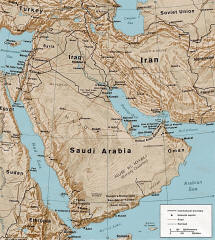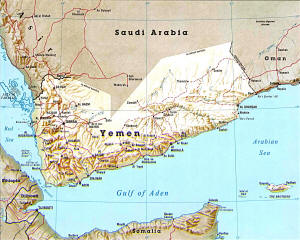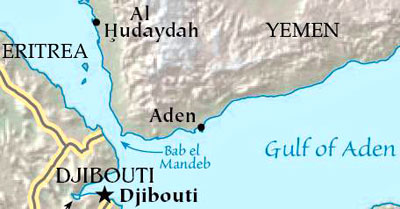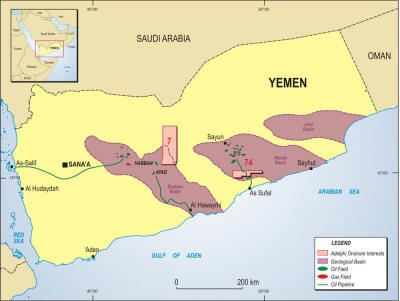|
Since then reports have been broadcast from CNN, the New York Times and other sources that he was "suspected" of having been trained in Yemen for his terror mission. What the world has been subjected to since is the emergence of a new target for the US ‘War on Terror,’ namely a desolate state on the Arabian Peninsula, Yemen.
A closer look at the background suggests the
Pentagon and US intelligence have a hidden agenda in Yemen.
The evidence suggests that the Pentagon and US intelligence are moving to militarize a strategic chokepoint for the world’s oil flows, Bab el-Mandab, and using the Somalia piracy incident, together with claims of a new Al Qaeda threat arising from Yemen, to militarize one of the world’s most important oil transport routes.
In addition, undeveloped petroleum reserves in
the territory between Yemen and Saudi Arabia are reportedly among the
world’s largest.
This has conveniently turned the world’s
attention on Yemen as a new center of the alleged Al Qaeda terror
organization.
Al-Fadhli had been a member of the Mujahideen movement in Afghanistan in the late 1980’s. His break with the government was reported in Arab and Yemeni media in April 2009. Al-Fadhli’s break with the Yemen dictatorship gave new power to the Southern Movement (SM).
He has since become a leading figure in the alliance. Yemen itself is a synthetic amalgam created after the collapse of the Soviet Union in 1990, when the southern Peoples’ Democratic Republic of Yemen (PDRY) lost its main foreign sponsor.
Unification of the northern Yemen Arab Republic and the southern PDRY state led to a short-lived optimism that ended in a brief civil war in 1994, as southern army factions organized a revolt against what they saw as the corrupt crony state rule of northern President Ali Abdullah Saleh.
President Saleh has held a one-man rule since
1978, first as President of North Yemen (the Yemen Arab Republic) and since
1990 as President of the unified new Yemen. The southern army revolt failed
as Saleh enlisted al-Fadhli and other Yemeni Salafists, followers of a
conservative interpretation of Islam, and jihadists to fight the formerly
Marxist forces of the Yemen Socialist Party in the south.
Since then Saleh has relied on a strong
Salafist-jihadi movement to retain a one-man dictatorial rule. The break
with Saleh by al-Fadhli and his joining the southern opposition group with
his former socialist foes marked a major setback for Saleh.
The April demonstrations included for the first
time a public appearance by al-Fadhli. His appearance served to change a
long moribund southern socialist movement into a broader nationalist
campaign. It also galvanized President Saleh, who then called on Saudi
Arabia and other Gulf Cooperation Council states for help, warning
that the entire Arabian Peninsula would suffer the consequences.
On September 11, 2009, in an Al-Jazeera TV interview, Saleh accused Iraq’s Shi’ite opposition leader, Muqtada al-Sadr, and also Iran, of backing the north Yemen Shi’ite Houthist rebels in an Al-Jazeera TV interview.
Yemen’s Saleh declared,
Yemen authorities claim they have seized caches of weapons made in Iran, while the Houthists claim to have captured Yemeni equipment with Saudi Arabian markings, accusing Sana’a (the capital of Yemen and site of the US Embassy) of acting as a Saudi proxy.
Iran has rejected claims that Iranian weapons
were found in north Yemen, calling claims of support to the rebels as
baseless. [4]
Economic conditions in the country took a drastic downward slide in 2008 when world oil prices collapsed. Some 70% of the state revenues derive from Yemen’s oil sales. The central government of Saleh sits in former North Yemen in Sana’a, while the oil is in former South Yemen.
Yet Saleh controls the oil revenue flows. Lack
of oil revenue has made Saleh’s usual option of buying off opposition groups
all but impossible.
According to al-Wahayshi, the new group, al Qaeda in the Arabian Peninsula, would consist of his former Al Qaeda in Yemen, as well as members of the defunct Saudi Al Qaeda group.
The press release claimed, interestingly enough,
that a Saudi national, a former Guantanamo detainee (Number 372), Abu-Sayyaf
al-Shihri, would serve as al-Wahayshi’s deputy.
The video threatens Muslim leaders - including
Yemeni’s President Saleh, the Saudi royal family, and Egyptian President
Mubarak - and promises to take the jihad from Yemen to Israel to "liberate"
Muslim holy sites and Gaza, something that would likely detonate World War
III if anyone were mad enough to do it.
As it is well-established that torture methods are worthless to obtain truthful confessions, some have speculated that the real goal of CIA and Pentagon interrogators at Guantanamo prison since September 2001, has been to use brutal techniques to train or recruit sleeper terrorists who can be activated on command by US intelligence, a charge difficult to prove or disprove.
The presence of two such high-ranking Guantanamo
graduates in the new Yemen-based Al Qaeda is certainly ground for
questioning.
That has not hindered Saleh from claiming the
Southern Movement and al Qaeda are one and the same, a convenient way to
insure backing from Washington.
Conveniently, the same day, Al Qaeda made a
large profile declaring its support for southern Yemen’s cause.
He promised retaliation:
The curious emergence of a tiny but
well-publicized al Qaeda in southern Yemen amid what observers call a
broad-based popular-based Southern Movement front that eschews the radical
global agenda of al Qaeda, serves to give the Pentagon a kind of casus belli
to escalate US military operations in the strategic region.
The Pentagon claimed its attacks on December 17 and 24 killed three key al Qaeda leaders but no evidence has yet proven this. Now the Christmas Day Detroit bomber drama gives new life to Washington’s "War on Terror" campaign in Yemen.
Obama has now offered military assistance to the
Saleh Yemen government.
In a sign of sophisticated skills in using western media, pirate commander Mohamed Shakir told the British newspaper The Times by phone,
The US intelligence brief, Stratfor, reports
that The Times, owned by neo-conservative financial backer, Rupert
Murdoch, is sometimes used by Israeli intelligence to plant useful
stories.
As of December 22, attacks by Somali pirates in the Gulf of Aden and the east coast of Somalia numbered 174, with 35 vessels hijacked and 587 crew taken hostage so far in 2009, almost all successful pirate activity, according to the International Maritime Bureau's Piracy Reporting Center.
The open question is, who is providing the
Somali "pirates" with arms and logistics sufficient to elude international
patrols from numerous nations?
Sheikh Sharif, whose own base in Mogadishu is so
weak he is sometimes referred to as President of Mogadishu Airport,
told Saleh he would share information with Saleh about any terror activities
that might be launched from Somali territories targeting stability and
security of Yemen and the region.
The US Government Energy Information Agency states that,
Bab el-Mandab, between Yemen, Djibouti, and Eritrea connects the Red Sea with the Gulf of Aden and the Arabian Sea.
Oil and other exports from the Persian Gulf must pass through Bab el-Mandab before entering the Suez Canal. In 2006, the Energy Department in Washington reported that an estimated 3.3 million barrels a day of oil flowed through this narrow waterway to Europe, the United States, and Asia.
Most oil, or some 2.1 million barrels a day, goes north through the Bab el-Mandab to the Suez/Sumed complex into the Mediterranean.
An excuse for a US or NATO militarization of the waters around Bab el-Mandab would give Washington another major link in its pursuit of control of the seven most critical oil chokepoints around the world, a major part of any future US strategy aimed at denying oil flows to China, the EU or any region or country that opposes US policy.
Given that significant flows of Saudi oil pass
through Bab el-Mandab, a US military control there would serve to deter the
Saudi Kingdom from becoming serious about transacting future oil sales with
China or others no longer in dollars, as was recently reported by UK
Independent journalist Robert Fisk. France’s Total and several smaller international oil companies are engaged in developing Yemen’s oil production.
Some fifteen years ago I was told in a private meeting with a well-informed Washington insider that Yemen contained "enough undeveloped oil to fill the oil demand of the entire world for the next fifty years."
Perhaps there is more to Washington’s recent
Yemen concern than a rag-tag al Qaeda whose very existence as a global
terror organization has been doubted by seasoned Islamic experts.
|




